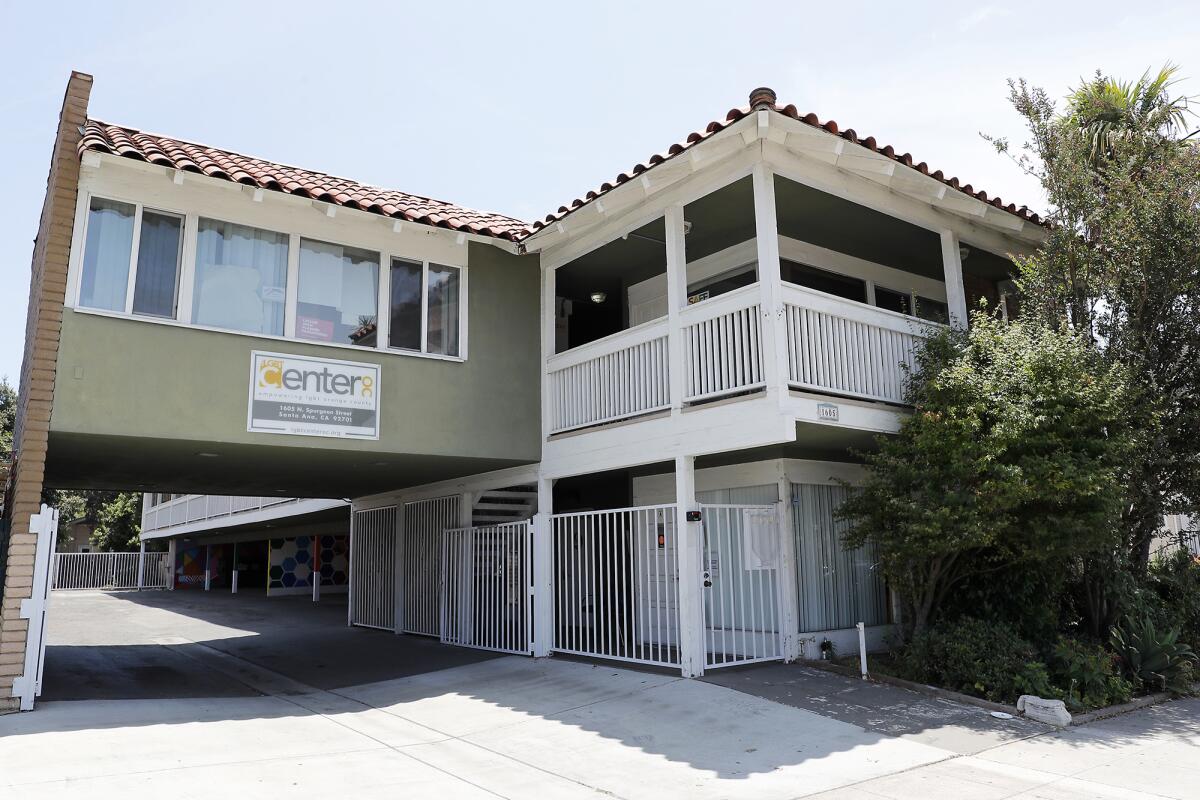LGBTQ Center OC begins its first phase of reopening but remains mostly virtual

As the LGBTQ Center OC starts its first phase of reopening, most of its programming will continue to be virtual, and the insights learned through working on online platforms could be long-lasting.
The center shut down its Santa Ana building in mid-March. Programming and resources like social support groups and mental health therapy continued to be available online, while the HIV-testing clinic and services were paused.
However, the center is partially opening for in-person STI testing starting June 26. Clients are directed to fill out a questionnaire evaluating whether they are symptomatic for COVID-19 in order to qualify for an appointment.
To determine a reopening timeline, the center’s leadership is keeping an eye on government and health officials’ recommendations as well as the number of new coronavirus cases. O.C. continues to spike in the number of cases and deaths, with Santa Ana being one of the hardest-hit cities in the county.
In the meantime, staff found success in virtual programming and expanded their reach to a bigger audience.
The LBGTQ Youth Convening conference led by the center’s group, Youth Empowered to Act. This year, the conference was scheduled on Zoom over three consecutive Saturdays in May.
About 500 people participated in the virtual conference, while last year’s in-person event garnered about 200, according to Stephanie Camacho-Van Dyke, the center’s director of advocacy and education.
“We have this opportunity to really connect with LGBTQ and allow them to not feel so isolated, because we do have youth participants from all over the country, and some are international,” Camacho-Van Dyke said.
She also said the virtual conference led staff to rethink how they can support people from areas outside of Orange County. They are brainstorming programming for the fall keeping in mind what they have learned throughout the past three months.
Local educator Heather Chapman spent roughly 43 minutes presenting on the nuances between an ally, advocate and activist.
“It felt so empowering; I finally felt like I was doing something,” said Chapman as she recalled taking part in a counter-protest about education. “It doesn’t mean I wasn’t doing something before, but this meant something.”
Chapman’s webinar was part of a conference week dedicated to the theme of empowerment. It livestreamed right before protesters took to the streets in Southern California against anti-Black racism and the death of George Floyd.
With a virus pandemic and protest taking over, it’s a complicated moment for the LGBTQ community. To some, the two major 2020 events seem like echoes of the AIDS crisis and Stonewall riots (the catalyst event for the formation of the Gay Liberation Front).
Early in June, the center hosted a Zoom meeting with community members and staff from multiple LGBTQ centers across the country, including the Bay Area, Texas and New York.
They screened “State of Pride,” a free YouTube Original documentary taking a look at what LGBTQ Pride means to a younger generation, and used the rest of the meeting to discuss current events and to reevaluate what Pride looks like in their own communities.
“We talked about how Pride started as a protest, and it was more community-based,” said Camacho-Van Dyke. “Then we see a shift where it becomes more of a party zone for white, cis, gay men. It was started by trans women of color, and that got lost somewhere in there, so we wanted to talk about those issues.”
The center’s staff also saw an uptick in clients seeking teletherapy. The mental health service is set up as a pay-what-you-can system and available for anyone, including those not part of the LGBTQ community.
“There are increased feelings of anxiety and isolation,” said Peg Corley, executive director. “Uncertainty about the future invokes anxiety, but there’s also the financial stress. Financial stress is disproportionately affecting all marginalized communities, and LGBTQ is a part of that.
Like its participants, the center itself has lost some revenue and received government relief funding.”
Corley doesn’t expect any layoffs or furloughs but said staff is feeling the weight of “having to work harder than [they] did before the pandemic to serve more people. Last week, there were a couple of really positive rulings from the Supreme Court that lifted us considerably.”
Recently, the Supreme Court ruled that LGBTQ employees are protected from workplace discrimination and in favor of continuing the DACA program.
The uplift for the center will continue with an intimate virtual Lavender Graduation on Saturday celebrating the achievements of LGBTQ students in middle school, high school and college.
All the latest on Orange County from Orange County.
Get our free TimesOC newsletter.
You may occasionally receive promotional content from the Daily Pilot.




